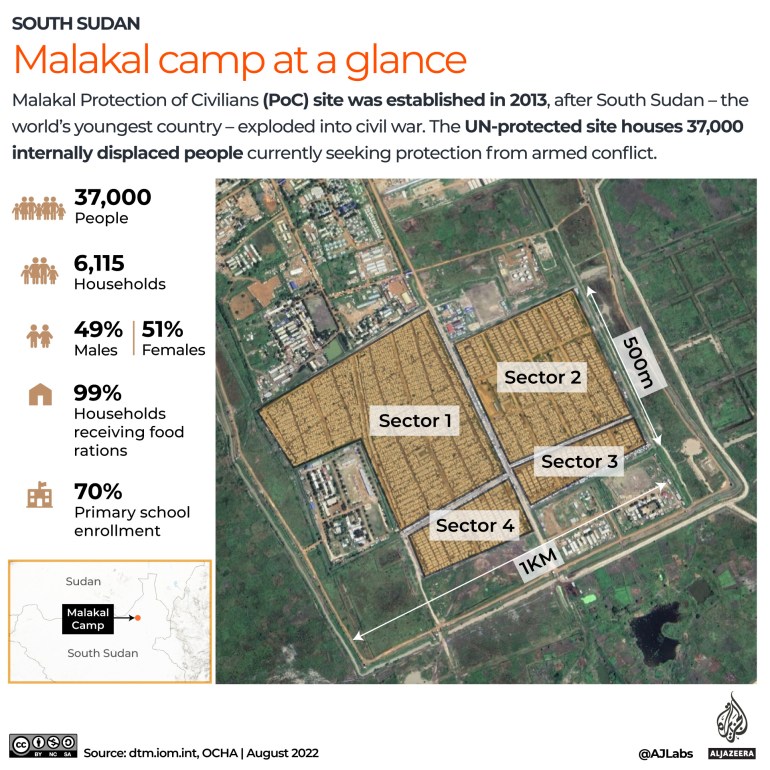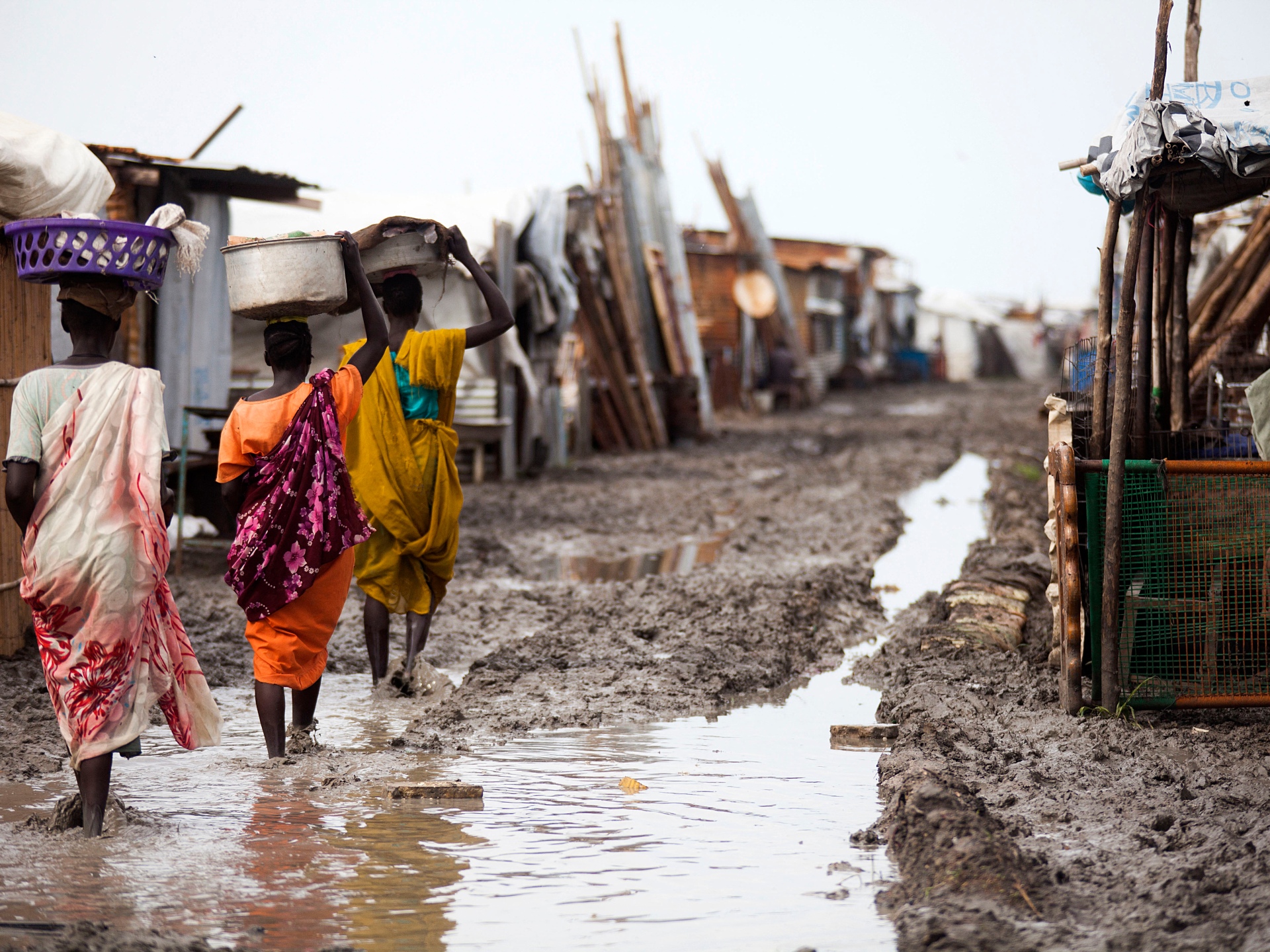Malakal, South Sudan – Accounts of sexual abuse committed by aid workers at a camp run by the UN in South Sudan first surfaced in 2015, two years after the country’s civil war erupted. Seven years on, such reports have not only continued, but they recently increased, an investigation by The New Humanitarian and Al Jazeera found.
The revelations come at a tense time, with the UN estimating that as many as 5,000 displaced people may be headed towards the camp in Malakal soon and current residents worrying that this influx may increase the incidents of sexual abuse and exploitation (SEA). They say these incidents have gone largely unchecked despite a UN-led task force charged with tackling the problem.
Residents also worry that the recent violence that these people are fleeing will seep into the Protection of Civilians (PoC) site – recent clashes between Shilluk and Nuer tribespeople in the camp have already flared up.
Aid workers who have worked at the PoC site told reporters that accounts of abuse began trickling in shortly after the camp opened in late 2013, but The New Humanitarian and Al Jazeera’s investigation found that the scale of abuse has since grown, according to aid workers, camp residents, and victims. Reporters also analysed several UN and NGO documents.
One woman said she became pregnant in 2019 by a local World Food Programme (WFP) worker – although the relationship was consensual, most aid groups, including WFP, ban sexual relationships with aid beneficiaries because of the stark power imbalances between aid workers and aid beneficiaries. She told reporters in December 2021 that she is so worried about the continuing sexual abuse that she is putting her eldest daughter, now 15, on birth control.
A teenager said she was 15 when a local World Vision worker raped and impregnated her. Fearful of her future, she said she tried to hang herself before deciding to leave the camp in an attempt to build a better life.
World Vision said it was opening an immediate investigation into the woman’s case, while WFP said it could not comment on specific cases.
“The people sexually exploiting and abusing women in [protection sites] are the very people meant to serve and protect them; their entire lives depend on services from these same aid workers.” Aluel Atem, activist
The women’s allegations tally with those of other camp residents – testimonies that were detailed in a UN Population Fund (UNFPA) report sent to humanitarian agencies on October 5, 2020, and shared with The New Humanitarian and Al Jazeera by an aid worker who asked to remain anonymous due to fear of reprisals.
In the report, residents said sexual exploitation was experienced “on a daily basis”, mostly perpetrated by humanitarian workers; UN and NGO workers were renting houses in the camp to have sex with women, and UN peacekeepers were paying bribes to gain access to women. Camp residents also said that three girls had been raped and impregnated by a teacher in 2018. Some schools in the camp are supported by UN agencies and NGOs.
Further accounts of abuse continued for at least 18 months after the release of the report.
“I received with greatest alarm information on the increased incidents of sexual abuse and exploitation (SEA) in Malakal Protection of Civilians (POC) site,” Sara Beysolow Nyanti, deputy head of South Sudan’s UN peacekeeping mission, stated in a March 21, 2022, letter sent to some 17 aid organisations working in the camp, as well as several camp coordination groups. A copy of the letter, which was not made public, was obtained by The New Humanitarian and Al Jazeera.

Nyanti, who assumed her role in January 2022, said the reported increase was noted during a meeting with humanitarian partners in the Malakal PoC, which now hosts some 37,000 people.
She told reporters in an email on August 12 that tackling such abuse is one of her “top priorities”, but she did not offer comment on why past strategies may have fallen short.
The reference to an increase, even if aid officials declined to give information on specific cases or were unable to provide a fuller picture, offers a rare glimpse into a grossly underreported problem, and one that comes up around the UN and aid sector often.
Aid groups acknowledged that hurdles remain in tackling such abuse. Their representatives told reporters they are working towards increasing awareness about what constitutes exploitation and how to report it. Measures include holding talks with the community, broadcasting messages over the radio, and sharing hotline numbers to raise awareness.
Although some women said sex was consensual, they also told reporters that they had no other means of supporting themselves or their families without the money or gifts the men provided. They said they feared if they stopped having sex with the aid workers, support would stop.
“Sexual exploitation and abuse is a consequence of the broader abuse of power and gender inequality, which is entrenched in existing social and institutional structures and practices,” Peterson Magoola, a spokesperson for UN Women told reporters in an email. UN Women has co-chaired the national task force since 2018.
According to the UN, sexual exploitation is defined (PDF) as any actual or attempted abuse of one’s position of power, using vulnerability or trust, for sexual purposes. It forbids it because it is based on unequal relationships, noting any kind of transaction for sex – such as providing gifts or offering support – reflects this unequal power balance.
“Consent is irrelevant; even if someone accepts a gift or support … the transaction is still considered exploitative,” reads a guide.
UN Secretary-General Antonio Guterres’s office did not respond to a request for comment on the The New Humanitarian and Al Jazeera’s investigation in time for publication.

